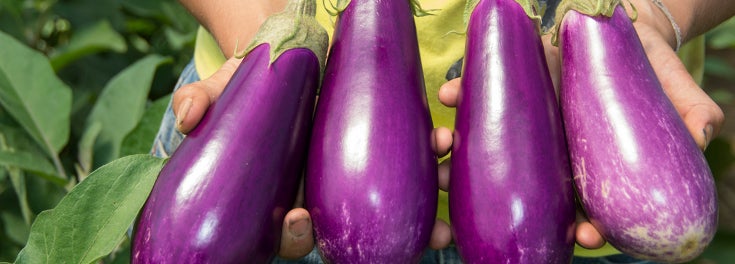
This summer there’s a lot of good work being done on the Kingston Campus—real get-your-hands-dirty, hard work—and the results are spectacular and can be measured in tons.
Where? Just off Route 138 by the URI athletic facilities, the location for Gardner Crops Research Center, better known as Agronomy Farm.
“We currently have 19 acres in production there—the farm is over 150 acres but most of the land is rented to New England Turf for sod production,” said Rebecca Brown, associate professor in the department of plant sciences and entomology, who conducts research, works with grad students in the areas of sustainable vegetable production and low-input grasses—and spends a lot of time at Agronomy Farm.
“It has been a great summer for veggies,” said Professor Brown. “We grow a little of everything, and a lot of some things. This year we have a lot of tomatoes, cantaloupe, sweet corn, potatoes, cucumbers, and butternut squash. So far I’d say the melons are the best crop, but we have just started harvesting sweet corn, and won’t harvest the butternut squash until September.”
The annual amount of food donated usually exceeds 10 tons. It varies some, since a bushel of potatoes weighs a lot more than a bushel of greens.
Both undergrad and grad students are involved in every aspect of vegetable production from planting to harvest. Although undergrads are from a range of majors, plant sciences students can earn internships or independent study credit. All of the student crew, whether earning credit or not, are compensated for their work at the farm.
Grad students do thesis research with faculty at the farm. Rebecca Long, who received a M.S. in Biological and Environmental Science with a specialization in Sustainable Agriculture and Food Systems in May 2015, spent a lot of time at the farm over the last two years. Her research involved using composted yard waste, gelatin manufacturing waste, and restaurant waste as fertilizer to grow vegetables such as butternut squash, potatoes, and sweet corn.
“I was responsible for maintaining my experimental plots and since I had previous farm experience I was able to do everything from drive the tractor to harvest,” she said. “And weeding—there’s always a LOT of weeding!”
“A lot of the vegetables grown for research go to the Rhode Island Food Bank, in addition to the crops we grow specifically for them,” says Professor Brown, who runs the food donation program. “We’ve been sending produce to the food bank since 2004.” The farm also donates to The Jonnycake Center in Peacedale.
“We donate into the fall, usually ending in October,” she added, noting the annual amount of food donated usually exceeds 10 tons. “It varies some, since a bushel of potatoes weighs a lot more than a bushel of greens. A lot of the lighter stuff goes to Johnnycake because it is more perishable, and they distribute the veggies to their clients within hours of when we get the produce to them.
“We also sell produce to the dining halls, particularly Butterfield. Herbs, lettuce, potatoes, tomatoes, and winter squash have been some of our biggest sellers to Dining Services. We use the proceeds from vegetable sales to help support the farm.”
What happens right on campus at Agronomy Farm—a perfect combination of science, learning, hard work, community, and lots of weeding—makes a difference in many ways, not the least of which is putting good food on the table in many Rhode Island homes.
